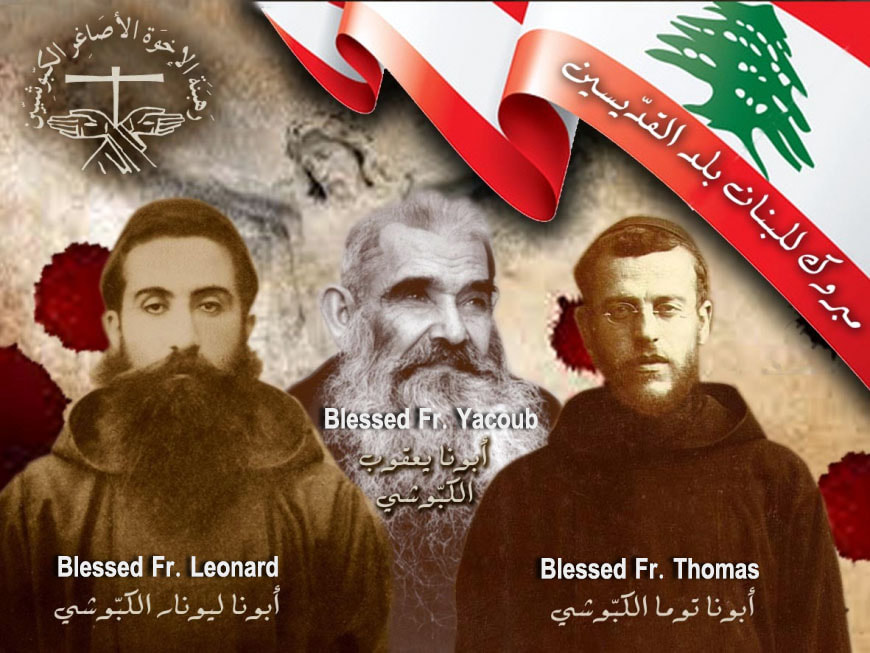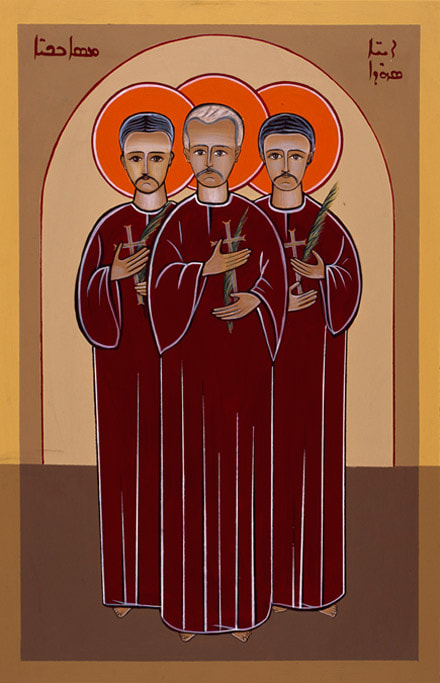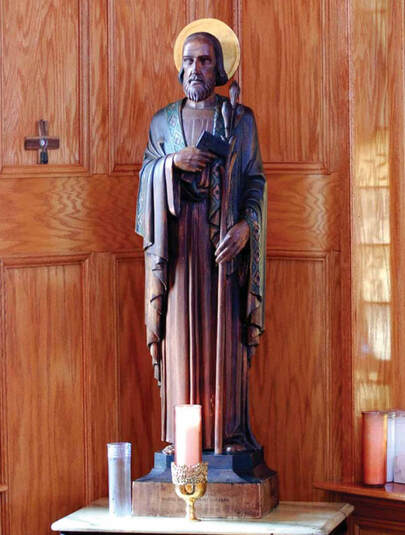|
"Holiness is the most attractive face of the Church" (Pope Francis, Gaudete et Exsultate, 9).
In the midst of the darkness that our world has been enduring for more than two years, and in the face of an uncertain future, the Lord generously offers us two new blesseds: Thomas and Leonard of Baabdat. They come from a biblical land - certainly - but also from a region of the world that has known only war and persecution. Lebanon, a small country that has already given to the Order Blessed Abouna Yacoub (Jacob of Ghazir), Apostle of the Cross, will have the joy of celebrating the beatification of two more Capuchins who were both missionaries and martyrs, this June 4, 2022 in Beirut... My dear brothers, the two blesseds, Thomas and Leonard, who died in odium fidei (in hatred of the faith), during the worst genocide of the twentieth century, are a wonderful example of charity and fraternal self-denial. Amid this persecution, which claimed two million victims, the first sacrificed himself for an Armenian priest; the second, for a brother." An excerpt from the letter by Br. Roberto Genuin, General Minister of the Capuchin Friars Minor. Click HERE to learn more about these new blesseds.
0 Comments
On July 17, The Maronite Church celebrates the feast of Saint Marina.
As a monk she was known by the name Marinos. Although young, Marinos occupied himself with the practice of monastic virtues with utmost spirit and minuteness. He was silent and reticent with bowed head and eyes, making of his cowl a veil concealing the features of his face and eyes.
One day he was sent to a neighboring town on a mission for the Monastery. He was obliged to spend the night at the house of a friend of the monks named Paphnotius. Paphnotius had a young girl who had fallen into adultery and was found pregnant. Upon finding out, her father was enraged and demanded the name of the perpetrator. His daughter told him that Marinos the Monk had raped her the night he spent in their house. Her father went straight to the Monastery and told the Superior, who was surprised for he knew that Marinos is a pious and pure man. The Superior called Marinos and scolded him, but Marinos said nothing to defend himself. Consequently, the Superior was very perplexed and considered Marinos’ silence to be an admission of guilt. He then sentenced Marinos to dismissal and to be thrown outside the Monastery. Marinos resigned himself to the will of God and stayed at the door of the Monastery praying and crying, living off the leftovers of the monks’ food. His father had long since died. When the daughter delivered, the grandfather brought the child, a boy, to the Monastery and threw him to Marinos saying: “take and raise your son.” Marinos took the boy and began raising him with what the monks used to bring to him of goat milk and of leftovers from their table. This situation lasted four years. Marinos carried the shame of this hideous accusation without any complaints. However, the Superior had compassion for him and let him enter the Monastery under very strict conditions. Marinos accepted while shedding the tears of repentance. Marinos persevered in his ascetic work until the hour of his death when the features of his face glowed with a heavenly light. He asked forgiveness from all and he forgave all those who sinned against him. He then gave up his spirit. The Superior then ordered that his body be prepared for burial outside the Monastery. It was a great moment of astonishment when the monks found that Marinos was a woman and not a man. The Superior and the monks fell on their knees before the pure cadaver, asking God and the soul of the holy saint forgiveness. As for the father of the sinful daughter, he was ashamed and came to make his statement before everyone. As for the daughter, she spent her life crying and repenting at the tomb of the saint. The sanctity of Marina spread all over Lebanon, people from all its regions came to the Monastery of Qannoubine to be blessed by her body. Her tomb became a source of cures and graces." (Daher 1996: 189-190) This account on the life, legend, and relics of Saint Marina the Monk tells us but little about her passion, suffering, and humiliation. The Maronites remain to this day fascinated by this Saint. Among them, there is almost a righteous anger against the injustice that was done to her. To this day, her name is intertwined with that of the Monastery of Qannoubine and her nearby grotto is a reminder of her chastity, obedience, asceticism, humility, forgiveness, and sainthood.
On July 9th, 1860 a fire broke out through the Christian area of Damascus. Many Maronite families took refuge in a Franciscan monastery along with the Massabki brothers and the Superior, Father Emmanuel. )Father Emmanuel closed the Monastery and called everyone to the church where they prayed and made their confession and received communion. While everyone took refuge on the roof, Francis one of the Massabki brothers remained kneeling at the feet of the Sorrowful Mother. Moments later the church was attacked, The Superior Father was captured and told the attackers that he would lead them to the treasure inside the church. He proceeded to the altar, where he lit the candles and took out the Eucharist from the tabernacle. Father Emmanuel was then put to death.
The attackers then noticed Francis kneeling in prayer and recognized him. They told him that the Sheikh had sent them to save him and his family from death on the condition that he deny his faith and convert. Francis answered them, "Sheikh Abdullah can take my money, he can also take my life; but my faith no one can make me deny. I am a Christian and in the faith of Christ, I will die." Francis was then put to death. The attackers then confronted Abdel El –Maoti in the convent yard and also asked him to renounce his faith to escape death; He refused and was also martyred. Raphael, who was hiding inside the convent was offered the same as his brothers, but also refused and was also martyred. According to witnesses, the three Massabki brothers were buried in the convent along with the eight martyr priests and others who had sought refuge there. On October 7, 1926, His Holiness Pius XI proclaimed the beatification of the three brothers. The Massabki brothers are great role models for Maronite families. Although they were rather wealthy, they remained faithful and humble. We pray, that these great Maronites will soon be recognized amongst our Maronite Saints. We ask for their intercession to help us live our lives as honest Christians, and we pray for all those who are being persecuted around the world. May they find refuge and comfort in you Lord. Amen. (From: Living Maronites) "Month of Saint Joseph" by The Maronite Monks of Adoration
Mother Church through her Divine Liturgy holds up for us a saint who is silent, quiet, unknown and a seemingly retiring type. At least one who is recorded as having said not a single word whatever in the Sacred Scriptures and leaving us nothing whatever of himself. He came, he did his assigned task and he disappears from Sacred Scripture leaving not a trace. Yet assigned to him was the greatest task ever accorded a human being after Our Blessed Mother. No king who has reigned; no emperor has ever lorded it over vast territories; no group upon whom the great judgments of the world rest, have ever had anything comparable to the task assigned to St. Joseph; the Guardian of the Incarnation of God’s Only Begotten Son and the Guardian of His earthly Mother Mary. This was Joseph’s assignment. Because of this special task as Patriarch of the Holy Family, St. Joseph is the greatest of the patriarchs. In our spiritual readings we have seen from the Sacred Scriptures that St. John the Baptist is the greatest of the prophets. Now we see St. Joseph as the greatest of the patriarchs.
He has been formally declared the Heavenly Patriarch of the Universal Church. As Mary is the Mother of the Church, Joseph is THE Guardian of the Church. So it is that the Sacred Scriptures themselves canonize St. Joseph. Holy Scripture itself tells us that “Joseph was a just man!” He is the greatest of all the saints in Heaven after Mary. Like Mary, and after Mary, his sanctity may be greater than all the saints combined. Now it is that Mother Church in her liturgy holds out to us for the sacred time before Holy Week and Easter Week, to prepare ourselves and have us meditate upon, St. Joseph. For this Patriarch of Patriarchs, this Guardian of the Universal Church, we are asked to meditate upon and prepare for the coming of the Lord in His Passion and Resurrection. What we meditate upon in St. Joseph is a humble, poor workman, who left us nothing written or spoken. Who appears in the Sacred Scriptures out of nowhere and disappears from the Sacred Scriptures without notice or comment. Such is God’s view of greatness, and such is God’s way in dealing with men. And such is what God would have us meditate upon as we prepare for the coming of the Lord: JOSEPH THE SILENT; Joseph the dutiful. The vast majority of mankind, and so of us Christians live and die in obscurity — but not so before the Lord — not so in the Merciful Heart of Jesus who loves us all individually. All the world in the hoopla of the present era; a hoopla of unfortunate events and their consequences, I would suggest is the best we can do of ourselves. But Mother Church, through her liturgy, holds out to us St. Joseph, the silent, the humble unknown workman, as a model, an exemplar, who is also the greatest of all the patriarchs. Joseph is the patron of the silent. And with St. Francis de Sales, he is an exemplar of “love’s Martyrdom.” In this respect also he is THE patron of monks. Says St. Francis de Sales, ‘Joseph was a perfect mystic and martyr. Love’s mysticism causes love’s martyrdom. The sword of love’s mystic would rend his soul and body to immolate himself for the greatest task ever accorded a human being on earth; to be the heavenly appointed guardian and protector of Jesus and Mary; to center and focus his entire existence on Jesus and Mary; to live and to die in and for this cause.’ None of the patriarchs or the prophets of the Old Testament achieved that greatness. None of the Fathers and Doctors of the New Testament rendered or achieved the purity or dignity necessary to fulfill that task of Joseph the Silent, Joseph the Greatest. Now this is what Mother Church would have us think about this week – in order to fittingly prepare our souls for making present the grace of the Christ’s Sacred Passion. We pray in our Holy Mass: “O honorable and righteous Joseph, You served the Lord and His Mother, You carried in your arms the one who carries the world You support the One who supports all peoples, O mystery of Jacob realized, How blessed are you among all the saints.” O Holy and Glorious Joseph. |
Publishing DepartmentThe Family of Saint Sharbel has established a new Publishing Department. More
ProjectsLearn about our ongoing projects to help introduce Saint Sharbel and the Maronite spirituality to the English speaking communities. Check out our YouTube Channels
Saint Sharbel's Miracles & Healings .
Family of Saint Sharbel, USA.

Archives
July 2024
Categories
All
|





 RSS Feed
RSS Feed